
Gao Lishi (684–762), formally the Duke of Qi (齊國公), was a Chinese eunuch and politician of the Tang dynasty and the Wu Zhou dynasty, becoming particularly powerful during Emperor Xuanzong of Tang's reign. He is believed to have been in charge of many decisions that were supposed to be the emperor's responsibility during Emperor Xuanzong's later years, and was believed to have been richer than many of the nobility of the era. Despite this, however, he was often viewed as a positive example of eunuch participation in politics for his personal loyalty to Emperor Xuanzong, which withstood despite its putting himself in personal danger later, during the reign of Emperor Xuanzong's son Emperor Suzong as it drew jealousy from fellow eunuch Li Fuguo. Further, during the years of his highest power, he was also said to make no improper influences on governance, and therefore drew no anger from the intelligentsia. Late in Emperor Suzong's reign, he was exiled upon Li Fuguo's urging. After a pardon in 762, he was returning from exile, when he heard of Emperors Xuanzong's and Suzong's deaths. Mourning Emperor Xuanzong bitterly, he grew ill and died.

Yang Yuhuan, often known as Yang Guifei, and known briefly by the Taoist nun name Taizhen (太真), was the beloved consort of Emperor Xuanzong of Tang during his later years. She is known as one of the Four Beauties of ancient China.
Yang Guozhong, né Yang Zhao (楊釗), was a Chinese politician who served as principal chancellor of the Tang dynasty from 752 to 756, late in the reign of Emperor Xuanzong. Known in his youth as a gambler and wastrel, Yang rose rapidly to political power after his distant cousin, Yang Yuhuan, became Emperor Xuanzong's favorite consort in 744. His familial ties and skills as a financial administrator helped him navigate the tumultuous court politics of the late 740s and early 750s to become the emperor's leading chancellor in 752. While Yang enjoyed Emperor Xuanzong's trust, his competence as chancellor was questioned and he became entangled in a fierce rivalry with an erstwhile political ally, the general and imperial favorite An Lushan. Yang was blamed for precipitating An's cataclysmic rebellion in 755. In the following year, he forced the Tang army of Geshu Han, then holding favorable defensive positions in Tong Pass, to confront the rebel army, leading to a rout of Tang forces and the fall of the imperial capital, Chang'an. Yang attempted to flee to his base in Chengdu with Emperor Xuanzong, but when the imperial party stopped at Mawei Station in modern Shaanxi, Yang and his family, including Yang Yuhuan, were massacred by imperial guard soldiers who blamed them for the chaos.
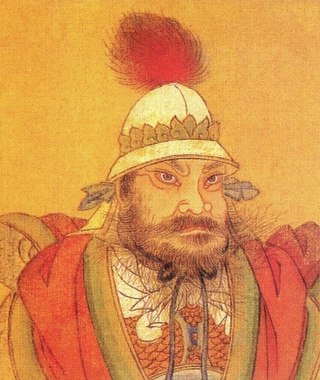
An Lushan was a general in the Tang dynasty and is primarily known for instigating the An Lushan Rebellion.

Emperor Xuanzong of Tang, personal name Li Longji, was an emperor of the Tang dynasty of China, reigning from 712 to 756 CE. His reign of 44 years was the longest during the Tang dynasty. Through two palace coups, he seized the throne and inherited an empire still in its golden age. He was initially assisted by capable chancellors like Yao Chong, Song Jing and Zhang Yue who were already serving as government officials before Xuanzong ascended the throne. However, under Emperor Xuanzong, the empire reached its turning point and went into sharp decline and near collapse, due to numerous political missteps throughout his long reign, such as over-trusting Li Linfu, Yang Guozhong and An Lushan, with Tang's golden age ending in the An Lushan Rebellion.
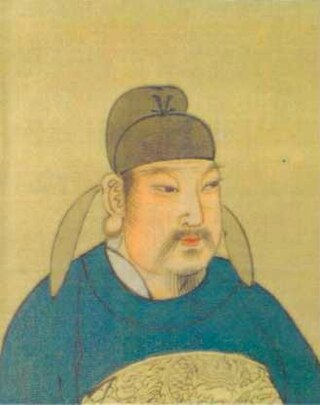
Emperor Xuanzong of Tang was an emperor of China's Tang dynasty, reigning from 25 April 846 until his death. Personally named Li Yi, later renamed Li Chen, and known before his reign as the Prince of Guang, he was considered the last capable emperor of Tang China. Succeeding emperors after Xuanzong would either be too young or be dominated by eunuchs or warlords. Emperor Xuanzong was the 13th son of Emperor Xianzong and an uncle of the previous three emperors, Emperor Jingzong, Emperor Wenzong, and Emperor Wuzong.

Emperor Suzong of Tang, personal name Li Heng, né Li Sisheng (李嗣升), known as Li Jun (李浚) from 725 to 736, known as Li Yu (李璵) from 736 to 738, known briefly as Li Shao (李紹) in 738, was an emperor of the Chinese Tang dynasty and the son of Emperor Xuanzong.
Princess Taiping (Chinese: 太平公主; pinyin: Tàipíng Gōngzhǔ, lit. "Princess of Great Peace", personal name unknown, possibly Li Lingyue was a royal princess and prominent political figure of the Tang dynasty and her mother Wu Zetian's Zhou dynasty. She was the youngest daughter of Wu Zetian and Emperor Gaozong and was influential during the reigns of her mother and her elder brothers Emperor Zhongzong and Emperor Ruizong, particularly during Emperor Ruizong's second reign, when for three years until her death, she was the real power behind the throne.
Li Fuguo, né Li Jingzhong (李靜忠), known from 757 to 758 as Li Huguo (李護國), formally Prince Chou of Bolu (博陸醜王), was a Chinese eunuch, military general, and politician during the reign of Emperor Suzong of the Chinese Tang dynasty. He had served Li Heng while Li Heng was crown prince under Li Heng's father Emperor Xuanzong and later supported Li Heng in ascending the throne during Anshi Rebellion, when Emperor Xuanzong's realm was thrown into confusion. He later became exceedingly powerful, in alliance with Emperor Suzong's wife Empress Zhang, but broke with her and killed her in 762 when Emperor Suzong died. He briefly became the paramount figure in the administration of Emperor Suzong's son and successor Emperor Daizong, but was removed and then killed by assassins sent by Emperor Daizong later that year.
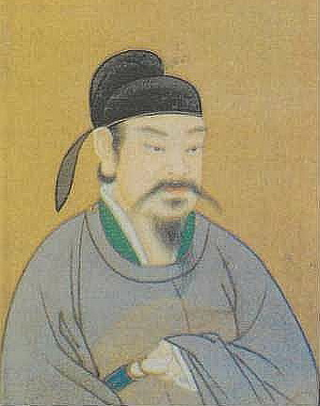
Emperor Ruizong of Tang, personal name Li Dan, also known at times during his life as Li Xulun, Li Lun, Wu Lun, and Wu Dan, was the fifth and ninth emperor of the Chinese Tang dynasty. He was the eighth son of Emperor Gaozong and the fourth son of Emperor Gaozong's second wife Empress Wu. He was wholly a figurehead during his first reign when he was controlled by his mother, and he was the titular and puppet ruler of the Tang Empire from 684 to 690. During his second reign after his mother's death, significant power and influence was exercised by his sister Princess Taiping.
Wei Jiansu (韋見素) (687–763), courtesy name Huiwei (會微), formally Duke Zhongzhen of Bin (豳忠貞公), was a Chinese politician who served as a chancellor during the reigns of Emperor Xuanzong of Tang and his son Emperor Suzong. As a young man, Wei served as a military aide to Emperor Xuanzong's father, the future Emperor Ruizong, then the Prince of Dan. He later served in various regional postings and senior offices at the Tang court in Chang'an, and though his conduct met with approbation, in the later stages of his career he was considered controllable. This, as well as his early connection to Emperor Ruizong, allowed the leading chancellor Yang Guozhong to install Wei as chancellor and director of the examination bureau late in Emperor Xuanzong's reign. During the chaos of the An Lushan Rebellion, Wei accompanied Emperor Xuanzong and Yang in their flight from Chang'an and was severely injured when the imperial guard massacred Yang and his family. Subsequently, after Emperor Suzong claimed imperial title and Emperor Xuanzong abdicated, Wei initially retained his chancellorship but was subsequently shifted to positions of less responsibility. He eventually left office altogether and died in retirement in 763.
Emperor Shang of Tang, also known as Emperor Shao (少帝), personal name Li Chongmao, was an emperor of the Tang dynasty of China, ruling briefly in 710.
Li Chengqi, known as Wu Chengqi during the reign of his grandmother Wu Zetian and as Li Xian after 716, formally Emperor Rang, was an imperial prince of the Tang Dynasty who served as crown prince during the first reign of his father Emperor Ruizong, who yielded that position to his younger brother Li Longji during Emperor Ruizong's second reign. Li Chengqi had a number of children, including his oldest son, Li Jin, the prince of Ruyang, who was called one of the Eight Immortals of the Wine Cup by famous poet Du Fu.
Liu Youqiu, formally Duke Wenxian of Xu (徐文獻公), was a Chinese official of the Tang dynasty and the Wu Zhou dynasty, serving as a chancellor during the reigns of the Emperor Ruizong and the Emperor Xuanzong.
Cui Riyong 崔日用 (673–722), formally Duke Zhao of Qi 齊昭公, was an official of the Chinese Tang dynasty and Wu Zetian's Zhou dynasty, briefly serving as a chancellor during the reign of Emperor Ruizong.
Li Ying (李瑛), né Li Siqian (李嗣謙), known from 725 to 736 as Li Hong (李鴻), was a crown prince of the Chinese Tang Dynasty during the reign of his father Emperor Xuanzong. He was later removed and forced to commit suicide due to the machinations of Emperor Xuanzong's favorite and influential concubine Consort Wu and her powerful and corrupt ally, the chancellor Li Linfu.
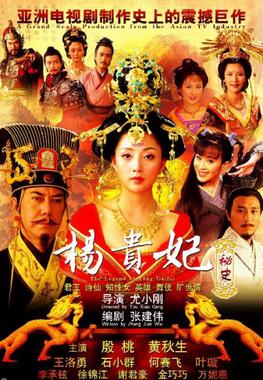
The Legend of Yang Guifei, also known as The Secret History of Concubine Yang, is a Chinese television series loosely based on the romance between Emperor Xuanzong of the Tang dynasty and his consort Yang Yuhuan. The series was directed by You Xiaogang and starred Yin Tao and Anthony Wong as the couple. It was first broadcast on Hunan Satellite TV from April to May 2010.

Women of the Tang Dynasty, also known as The World of Tang Women, is a 2013 Chinese television series based on events in the Tang dynasty starting from the late reign of Wu Zetian to Emperor Xuanzong's accession to the throne. The series was produced by Lafeng Entertainment, directed by Chang Hsiao-cheng, and starred an ensemble cast from various regions. Filming for the series started in October 2011 in Hengdian World Studios. The series was first shown on Hunan Satellite TV from 24 August to 23 September 2013.
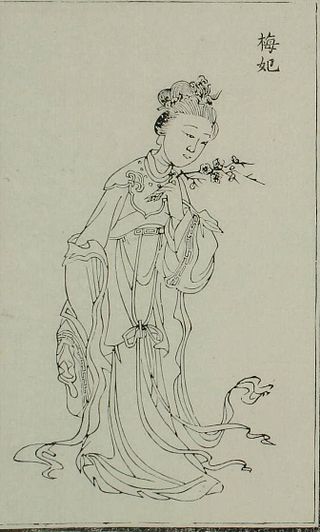
Consort Mei, born Jiang Caipin, is a fictional imperial consort of Emperor Xuanzong of Tang. Her name is not found in any official history book and only in "Biography of Consort Mei" (梅妃傳), preserved in a Yuan dynasty anthology and attributed to the Tang dynasty writer Cao Ye (曹鄴). In 1927, Lu Xun determined that the work was a Song dynasty forgery and should be considered no more than fiction. Later researchers have pointed out that her purported hometown, in the present-day coastal city of Putian, was actually under water during Emperor Xuanzong's time.
Empress Yuanxian also known as Yang Guipin was a Chinese imperial consort of Emperor Xuanzong and the mother of Emperor Suzong of Tang.









